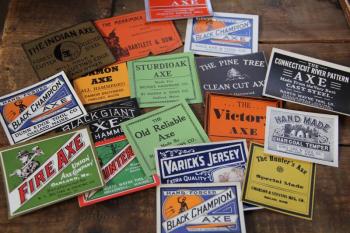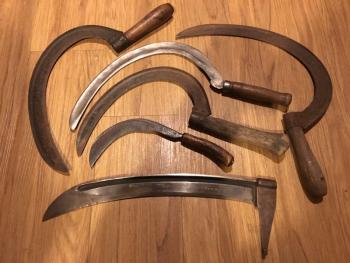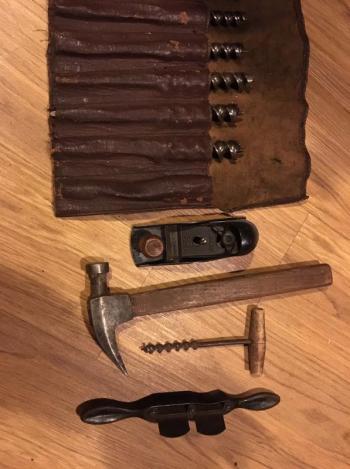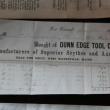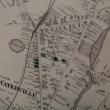UNITY — Alexander Koch began building a unique collection of Maine history as a child, though he has significantly grown his collection over the last six years upon his return from a short stint on the west coast of the United States.
The Unity resident is an avid collector of pieces related to Maine’s logging and outdoor recreation history.
Alongside books and maps, Koch has a large collection of photographs, postcards, billheads and a sub-collection of axe labels.
The photographs and postcards showcase the history of logging operations and individuals who camped in the state’s woods, while the billheads include receipts for forest tools and other products sold by Maine companies.
His sub-collection of axe labels span approximately a century, with the majority dating from the 1920s to the 1950s.
“My inspiration came from my love of the Maine woods,” Koch said of how he began his unique collection. “I grew up in Maine, including for my young childhood in Camden, and always spent as much time as possible out-of-doors. This instilled a reverence in the natural world and Maine in my young mind, which has only grown as I have aged.”
Koch, who says his collecting habits developed organically and on their own, won first prize for the 2017 National Collegiate Book Collecting Contest and has been asked to speak at the Ticknor Society’s round-table event at the Boston International Antiquarian Book Fair.
The pieces within his collection come from a variety of sources, Koch said, as he peruses antique shops, yard sales, estate sales, online sellers and rare and antiquarian book dealers to find the next addition to his collection.
“I enjoy the hunt for books, whether I know what I am looking for or not,” he said.
In deciding whether to add a piece he finds to his collection, Koch noted he is conscientious of the item’s condition, rarity, quality and how much the piece interests him.
“I have passed up particularly uncommon, even rare, books in order to buy a more common one in better condition, or that was more germane to my interests and overall collection,” he stated. “I will often, though not always, wait to obtain a first edition rather than take the first copy of a work that comes my way.”
Koch noted he also seeks to maintain a wide variety of items in his collection, which can factor into whether a piece should be added to his collection.
“Variety is important, and if I have already bought many specific lumbering-related histories, perhaps a book on natural ecosystems may seem more fitting, he said. “I would rather obtain an apposite book of great value to me than one unsuitable to my overarching goals as a collector.”
An additional factor in his decision making process is Koch’s endeavor to acquire books he does not own, giving those titles preference over ones he already owns.
His literary preferences lean towards titles from the mid-19th to mid-20th centuries. Titles from this time period hold an appeal others do not, he said, though he admitted to having more modern titles.
“I am just as happy to pick up a late 20th Century or 21st Century work if it is something unique to my collection and that examines the Maine woods in a unique manner,” he said.
The most unique aspect of his collection, Koch believes, are the axe labels, though he said he has a strong affinity for some of his oldest pieces such as A Statistical View of the District of Maine; more especially with reference to the value and importance of its interior by Moses Greenleaf (1816) and Report of an Exploration and Survey of the Territory on the Aroostook River During the Spring and Autumn of 1838 by Ezekiel Holmes (1839).
His 2002 edition of 13 Moons by Robert Chute — an exploration of early Maine through poetic verse in English, French and Passamaquoddy — from Kennebunkport’s Cider Mill Press also ranks highly as a favorite collected piece.
“Early Maine fascinates me, and the glimpses I get from the numerous town histories I have of that early exploration is amazing,” Koch remarked.
When not adding pieces to his collection or expanding his knowledge of Maine’s logging and outdoor recreation history, Koch can be found restoring tools, another aspect of life he fell into organically.
“I fell into it, as it were, and I was drawn immediately to the feeling of accomplishment I get when taking an old rusted tool and turning it into something that can be used again by a craftsman,” he said.
Koch spends parts of days digging through barns, sheds, basements and, of course, antique shops in his quest to find antique tools such as axes, saws, drawknives and spokeshaves.
A portion of his tool collection consists of grass hooks and a scythe blade made by Gervais Nolin of Skowhegan. Koch is the only person to have researched Nolin.
Some of the tools he finds will be restored and kept for his personal use, others will be restored and sold to fellow collectors. Tools of the state’s historical significance will not be restored and will either land in Koch’s personal collection or in the personal collection of a fellow collector.
“In some cases, knowing when to restore and when not to is as important as knowing how to restore a tool,” he said. “The value and historical worth of some items is better left untouched.”
As for the importance of his collection and restoration work, Koch firmly believes the preservation of history is vital to society’s future and he urges others to make the same contributions of historical preservation in their own regards, as they are able to.
Reach George Harvey at: sports@penbaypilot.com.



